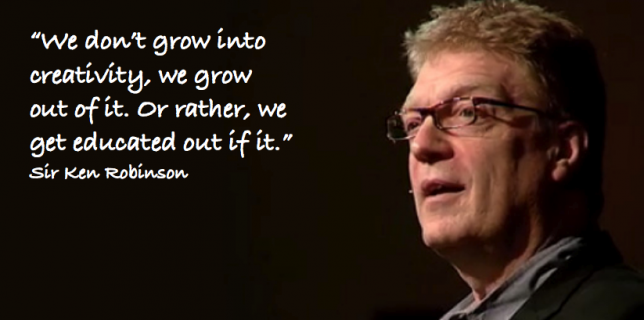
Adaptive, creative, social and personal is the new education
Today I followed the streaming of @SirKenRobisons in his talk for RSA “How to change education – from the ground up” –
https://www.youtube.com/embed/9HRXhRjfS7Q
RSA is the organization that realized the graphical edition of the speech of Ken Robinson “Changing education paradigm”
The today’s talk (Jul,1 2013) in about 45 minutes, had the aim to describe how to fix education, after his previous talks in which he described the troubles in education.
Of course, the years pass for everyone and today the event maybe was an opportunity to launch the new Robinson book: he was not brilliant as in the famous video for TED “ken_robinson_says_schools_kill_creativity'” that collected more than 14 millions views, and maybe I missed something, so I will watch again the recorded version of the talk.
He reiterated the concept that the education system today has a legacy that is derived from the industrial era, today a company where every 40 minutes a bell rings, and a group of people move from room to room to do different things, eight times per day wouldn’t be alive yet.
He argued that the issue of education can be approached from two points of view: economic and cultural. Entrepreneurs want an education that favored the maximum adaptivity and creativity, while from a cultural point of view, education should be more social, also with reference to the issue of democracy and even more personal, to encourage the development of talents, which I suppose to be the central thesis of his new book “Find your element”, sequel to “the Element” – which incidentally I purchased, started and abandoned as boring – the same things he says in the video in the TED 15 minutes.
The part I liked the most was the one in which he cited the theater (the theater is a bit ‘the metaphor of all I think … who remember the book ” Computer as a theater ” by Brenda Laurel), and in particular Peter Brook’s” Theatre can be a genuinely transformative experience ” to draw a parallel between actor and audience, teacher-student ..
The most important point is that the core of the educational process is the encounter between teacher and students, that it is an adaptive process and complex an ecosystem and that policy makers should invest on that, not on the process of “knowledge distribution”
Just in this day in an Italian newspaper published a news about the SteveJobs school in Nederland that from next september will give an iPad to every student, allowing flexiblity in the time pupils will stay at school and also if the teacher is absent for a short time, is not a problem for the student as all the lessons are on available and ready on the iPad.
Some of my network contact published enthusiastic comments to this news: I didn’t completely agree as I just read this article
Catching on at last – New technology is poised to disrupt America’s schools, and then the world’s,. The article speaks about the tremendous pressure of suppliers of IT solutions to the schools: in 2011, the peak of investment on education was almost to the levels of the dot.com bubble in the early 2000s, and various other aspects, related to the use of learning analytics (ie, profiling of students through the data provided by the various learning environments) and how all this eventually marginalize the weaker students, and finally as a teaching methodology heavily based on digital media can make use of facilitators that are not necessarily “full” teachers (fearing a demotion of teachers).
And what if the blended school model could be an opportunity also for the better teachers? This presentation How Blended Learning Can Improve the Teaching Profession argues that through digital technology, teachers may be allowed to work better.
At the end of the day, the most interesting reading, as suggested by a twitter during the conference of Sir Robinson, just related to the relation between teachers and students, was the Harvard Magazine article
“Twilight of the Lecture” where the prof. Manzur, said he found out – with a little dismay – that his students repeated perfectly what they were taught without understanding it in depth … and how then ihe suggested them to discuss with each other to clarify the concepts: the best part is where he says that the students were very angry to have to learn on their own, since they paid expensive fee and take exams on things that had not studied before.
We could talk about “critical thinking”, or “problem based education” or “inquiry based education” but it’s about learning to think, to put things into relations, to build hypotheses, and in that case the little girl that through her iPad is very fast in checking if the teacher said nonsense can be a resource and not a boring know-all.[:]